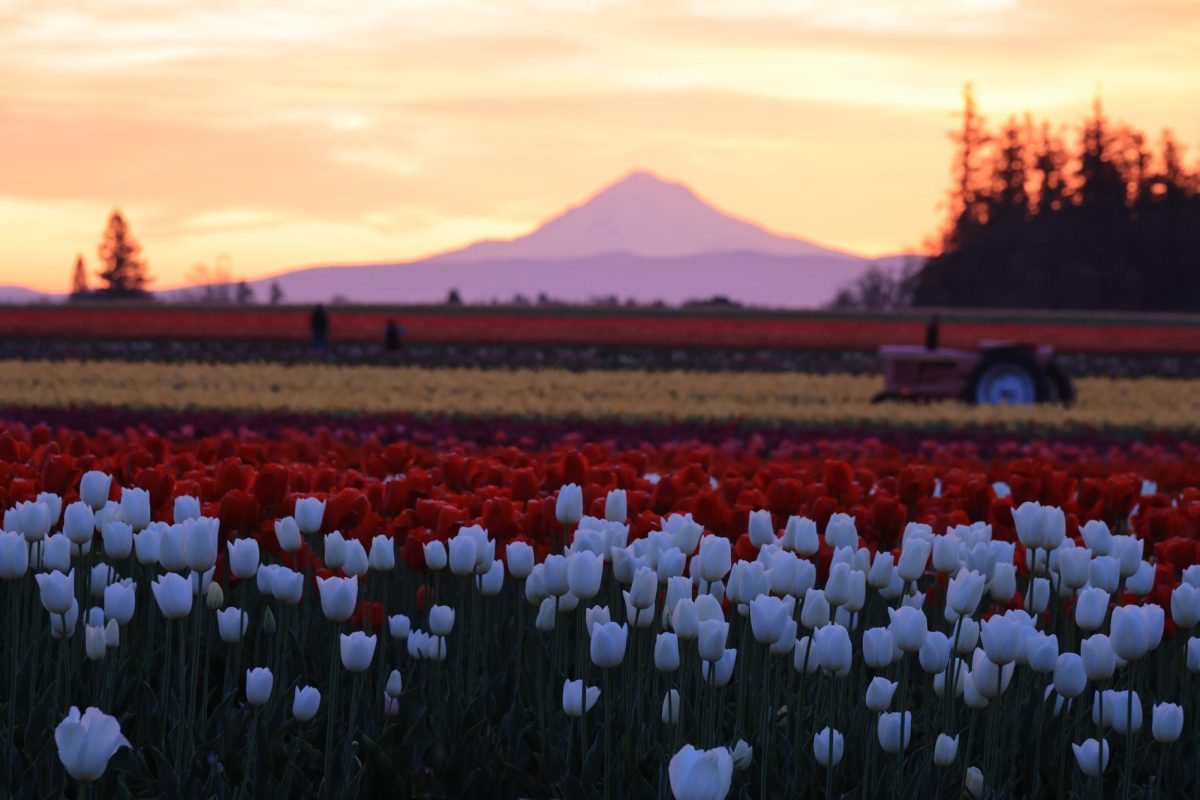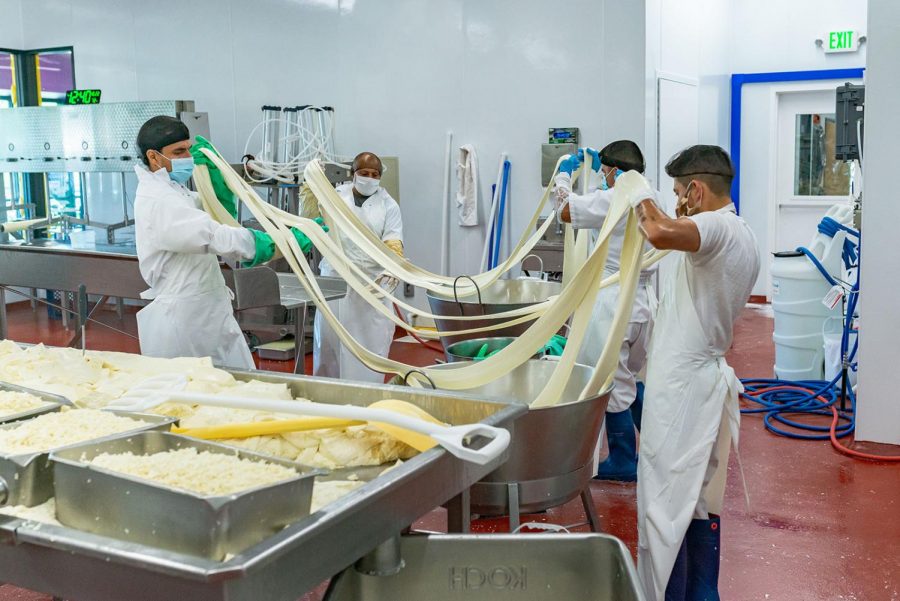UHDS sources locally-grown ingredients for food produced in all dining halls throughout campus
August 2, 2021
As part of the ongoing Menus of Change University Research Collaborative, Oregon State University’s University Housing and Dining Services aims to support the incoming 2021-2022 academic community by providing healthy, sustainable and plant-based foods.
Locally-sourced food products from facilities across Oregon and Washington are available for students and families to eat as part of their time on campus, with their first introduction to these foods typically happening during OSU’s summer START program.
For most academic years, the START orientation program brings many incoming first-year and transfer students to the OSU campus. Students and their families typically stay for one or two days to familiarize themselves with the Corvallis campus.
As part of historical START orientation experiences, incoming students could also visit any of the three main dining halls on campus: Marketplace West, McNary and Arnold
Dining Hall.
Although Governor Kate Brown has lifted most COVID-19 precautions, the entire START orientation program still remains virtual for incoming students. As such, UHDS will not be serving incoming students and their families as they have traditionally in the past as part of the orientation program, but will begin to in the fall.
Currently, UHDS has four distinctions when referring to these local foods: campus-made, regional, Oregon-grown and Northwest-grown.
Campus-made is defined as food grown, developed or processed at OSU. Beaver Cheese is a food considered to be classified as campus-made and is available at Tomassito’s at West Dining Hall and Five Four One at the McNary Dining Hall.
Regional is defined as grown, made or processed within one hundred miles of OSU. Camas Country Mills flour from Junction City is used within all dining halls on campus.
Camas Country Mill is an extension of the Hunton Family’s third generation farm, which has been established in the Willamette Valley for more than 50 years. At the farm, stone grist mills are used in production of flour, rather than conventional roller mills.
The farm in total is 2,700 acres, which is owned by the family and leased from local landlords. Crops grown on the farm include beans, lentils and grains for the Camas Country Mill.
Another product that is considered regional is Don Froylan’s cheese that is available for consumption at La Calle at the McNary Dining Hall. La Calle serves tacos, burritos, chips and queso, along with other Latin-inspired dishes. The creamery now produces its cheese in Salem, Ore., but it had been previously based in Albany until November of 2020.
The current owner of Don Froylan’s Creamery is Francisco Ochoa, who named the creamery after his father. Ochoa recalled his family immigrating from Mexico to the United States in the late 1990s in search of a better place to live.
“We went to California first because my brother was living there,” Ochoa said. “It was a little bit crazy over there, so we were exploring—my parents were exploring. We came to visit my cousin here in Oregon, and my parents fell in love with it and stayed here.”
Compared to other cheeses, Ochoa said that the cheese-making process for their Mexican cheeses are very similar. Different countries have slightly different processes and add slightly different ingredients to their
final products.
“Sometimes we’ll add spices [and] chiles,” Ochoa said. “For example, we have [a cheese] that we’ll add jalapenos and cilantro [to].”
Ochoa’s personal favorite is the queso fresco, which is a high-moisture and soft, crumbly cheese.
“It’s very fresh,” Ochoa said. “Basically, you use the milk from the farm, turn it into cheese and add a little bit of salt… You can put it on anything—put it on beans, tacos, enchiladas, sopes. It’s really fresh cheese, so it brings out the milk.”
Because of the COVID-19 pandemic, the Don Froylan Creamery had experienced many cancellations on their orders towards the beginning of the pandemic. Ochoa said nobody really knew what was going on, and everybody was in shock, closing their doors.
“A lot of people were asking if they could take cheese back,” he said. “A distributor was asking if they could take any of the cheese back that they had in stock—things like that came up.”
However, as restaurant businesses shut down over the course of the COVID-19 pandemic, grocery stores began to increase in demand for food products. Ochoa said the business from these grocery stores was what kept the creamery going throughout the pandemic.
“The grocery stores were buying sometimes double when the pandemic hit, because they didn’t have a lot of supplies themselves, because everybody was going to buy groceries,” Ochoa said. “Whatever people needed at home, everybody was buying. That’s what kept the creamery alive.”
Additionally, throughout the pandemic, the Don Froylan Creamery had been in the middle of constructing a new creamery located in Salem, Ore. Ochoa said he had worried about the finances of the project, such as whether or not the bank would continue with the loan they had been provided.
Fortunately, the construction of the creamery in Salem did continue on, but due to the pandemic, the doors of the creamery could not be opened immediately.
“That was a big drag for us because we wanted to be there, to open the doors and let people come in and buy ice cream,” Ochoa said. “We also have a quesadilla bar as well. People could come in [and] have a quesadilla while they watched us make cheese. All of that got put away; we didn’t do that until late March this year. It’s nice now that we can open the doors and let people in, and hopefully we can get back to sampling pretty soon.”
Oregon-grown is defined as grown, made or processed within the state of Oregon. As of time of publication, UHDS has no local foods defined as solely Oregon-grown. Northwest-grown is defined as grown, made or processed within Oregon and Washington. Norpac vegetables are produced from within Oregon and Washington and are available at all dining centers on-campus.
Headquartered in Salem, Ore., Norpac grows their produce on over 200 family-owned farms in the Northwest region. In total, the family farms hold over 35,000 acres throughout the region. Norpac focuses on non-genetically modified organism fruits and vegetables and keeps farms within 50 miles of plant facilities for packaging accessibility.
UHDS follows U.S Department of Agriculture standards for labeling food and food products as organic. These standards include, but are not limited to: producing food without “the use of genetic engineering, ionizing radiation and sewage sludge”; using “organic seeds and other planting stock when available”; and providing organic livestock and poultry with year-round access to the outdoors.
For foods that contain multiple ingredients, the foods must have at least 95% of the ingredients certified as organic.
The Food and Drug Administration has not yet developed a standard for natural; as such, UHDS “defines natural foods as not containing added color, artificial flavors, preservatives, synthetic substances (high fructose corn syrup), and no added growth hormones or antibiotics ever.”
However, some local products, such as fresh produce, are available only when in season. Not all local produce will be available year-round.



















































































![Newspaper clipping from February 25, 1970 in the Daily Barometer showing an article written by Bob Allen, past Barometer Editor. This article was written to spotlight both the student body’s lack of participation with student government at the time in conjunction with their class representatives response. [It’s important to note ASOSU was not structured identically to today’s standards, likely having a president on behalf of each class work together as one entity as opposed to one president representing all classes.]](https://dailybaro.orangemedianetwork.com/wp-content/uploads/2025/03/Screenshot-2025-03-12-1.00.42-PM-e1741811160853.png)























